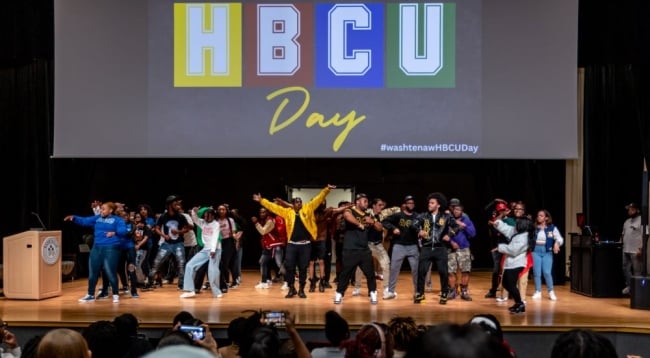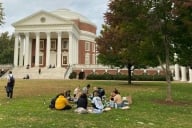You have /5 articles left.
Sign up for a free account or log in.

Washtenaw Community College hosts “HBCU Day” to expose local high school students to HBCUs and the college’s HBCU Pathway program.
J.D. Scott
Zaria Miller always wanted to end up at a historically Black college or university. But her home state of Michigan doesn’t have one.
Miller said she was looking for a sense of community. “I wanted to see people who look like me thrive. I wanted to have a college experience where I knew I could feel comfortable in my own safe space, with other people who look like me.”
Miller enrolled at Washtenaw Community College, and while searching online for campus events, she stumbled upon its HBCU Pathway program, designed for community college students like her, eager to transfer to HBCUs.
Launched in fall 2021 with three HBCU partners, the program now has transfer agreements with seven HBCUs across four states: Alabama, Ohio, Mississippi and Louisiana. Washtenaw students who want to transfer have guaranteed admission to any of the participating HBCUs, and nearly all of the institutions offer these students in-state tuition (Alabama State University offers them scholarships instead).
Miller transferred to Jackson State University through the program in 2023. She said attending panels focused on HBCUs at Washtenaw introduced her to Jackson State alumni who eased her transfer process by giving her a sense of what to expect.
Despite jitters about moving states and campuses, she told herself, “If they can do it, I can do it.”
Eric Reed, dean of student access, success, equity and inclusion at Washtenaw Community College, said community colleges and HBCUs are natural partners because of their “longstanding history of common values.”
Community colleges “emphasize expanded access for families denied access to higher education,” he said. “HBCUs were also founded on access to minorities who’ve been excluded from the educational system.” Both disproportionately serve low-income students, first-generation students and students of color and “both have a common value of affordability.”
Washtenaw isn’t the only community college building pathways to HBCUs.
Its program drew inspiration from the California Community College system’s Transfer Guarantee Agreement to HBCUs, launched in 2014, which allows eligible students at any of the system’s 116 campuses to transfer to 40 different HBCU partners. These students have guaranteed admission, priority for on-campus housing and student success coaches (alumni of these transfer pathways) who continue to check in with them after they move over. Some of the HBCUs also provide students with in-state tuition or scholarships.
Other colleges across the country have since started similar initiatives. For example, Onondaga Community College in New York announced two new transfer agreements with HBCUs last year. Durham Tech Community College also partnered with North Carolina Central University on a guaranteed transfer pathway that gives students early access to university resources, such as the library.
Washtenaw’s HBCU Pathway was born partly out of demand from students—administrators noticed them transferring to HBCUs such as Central State and Jackson State, two schools which are now partners in the program. Since its launch, roughly 140 students have transferred to HBCUs through the program. A cohort of 36 students will be transferring over the next year. (Washtenaw’s student body is about 35 percent students of color and about 15 percent African American.)
The California Community College system’s program has seen similar success, quadrupling its number of partners from the initial nine in its 2014 pilot. At least 400 students have transferred to HBCUs through the guarantee program since its launch.
Arynn Auzout Settle, project director, said the program started in response to a lack of seats for transfer students at California’s public universities. The program was also inspired by HBCU transfer partnerships already underway at El Camino College.
Auzout Settle believes these partnerships make particular sense after the COVID-19 pandemic hindered some high school students’ academic and social preparation for college.
She expects more students to turn to community colleges as the first stop on their higher ed journeys—and universities that previously didn’t focus on transfers will be more invested in cultivating these pathways as a result.
Community college can be a “preparation step for students that might not be clear on what they want to do” and allows them to figure it out at a lower tuition rate, she said.
She’s gratified to see more community-college-to-HBCU pathways cropping up and expanding because “it just benefits the student, first and foremost.”
Elizabeth Perryman, who transferred to Central State through Washtenaw’s HBCU Pathway in 2022, said the program's in-state tuition benefit helped her afford to go. Her favorite part of her time at the close-knit Ohio HBCU has been the university’s family-like environment.
“Really it’s like a bunch of my brothers and sisters on campus,” she said. “The smaller class sizes really help [professors] to be hands on, so they’re more like almost a second mom or a second dad the way they really take you in at an HBCU.”
Both Perryman and Miller returned to Washtenaw last year to volunteer at the college’s inaugural “HBCU Day,” an annual event that invites high school students to campus to hear presentations from HBCU program partners, attend college and career workshops and experience a taste of HBCU campus life. This year’s event featured a show by the Central State University marching band and a “stroll,” dance performances associated with the Divine Nine, historically Black sororities and fraternities.
The goal is “for students to see their future beyond their current reality,” Reed said. “We don’t have HBCUs in Michigan, so it’s kind of hard to get that type of exposure to the culture. But we were able to bring that to our county for the second year in a row, and it’s been very exciting for the students, for the community and just our campus in general.”
Miller said it was “surreal” to go back to Washtenaw for HBCU Day because of how much she saw herself in the students attending. Now she was the one regaling them with tales of Homecoming and other favorite experiences at Jackson State.
“I remember the days I wanted to go to an HBCU,” she said “… I remember when I was in those type of shoes.”









